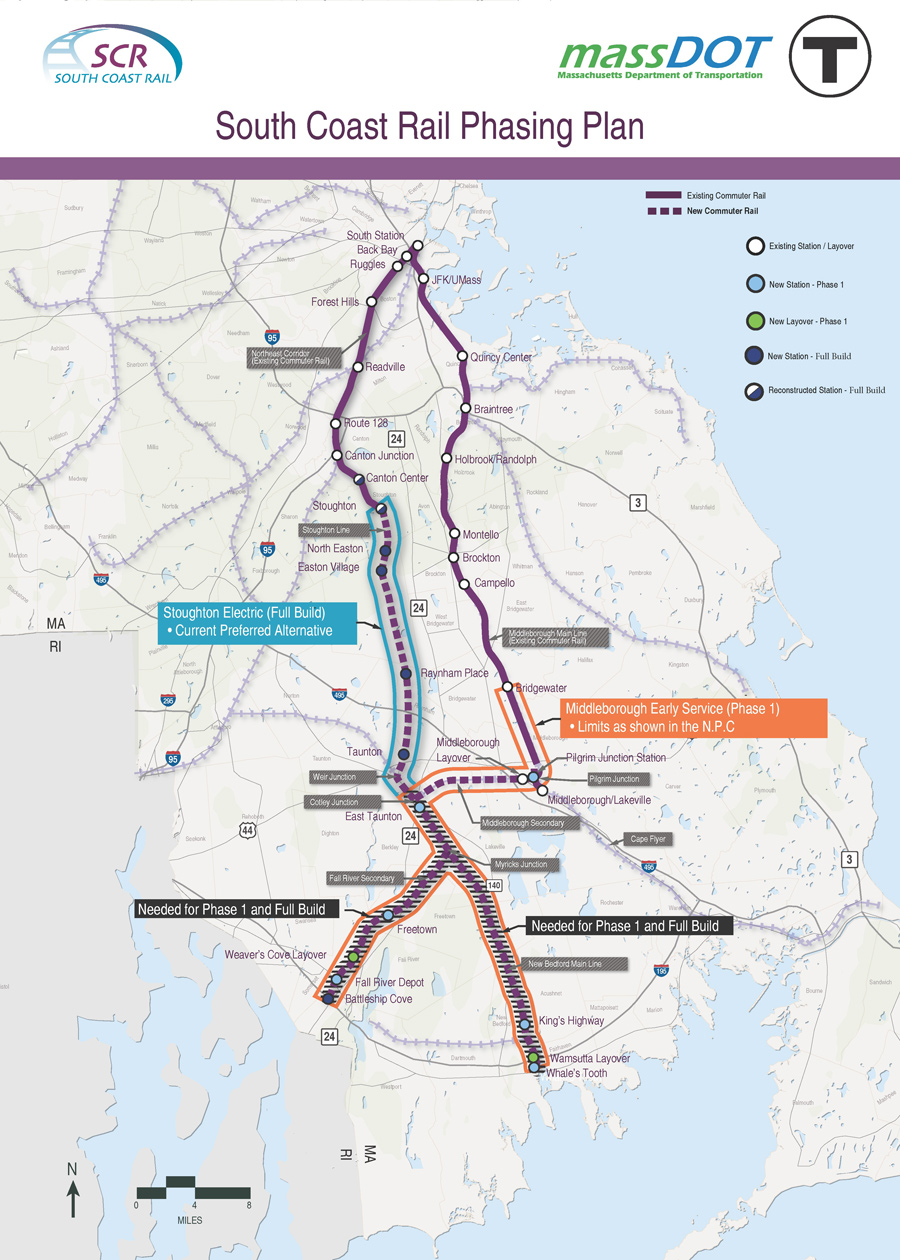Community
South Coast Rail project takes next step

BOSTON—The Massachusetts Department of Transportation (MassDOT) has announced that the South Coast Rail project is proceeding with the filing of the Draft Supplemental Environmental Impact Report (DSEIR) with the Massachusetts Environmental Policy Act (MEPA) Office. The DSEIR document analyzes only the new elements proposed as part of Phase 1 that were not previously analyzed in the Final Environmental Impact Statement (FEIS)/Final Environmental Impact Report (FEIR).
“Lieutenant Governor Polito and I are committed to following through on decades of promises and today’s filing is a vital step toward bringing reliable, affordable rail service to the South Coast,” said Governor Charlie Baker.
“The Baker-Polito Administration is filing this document with MEPA because the Commonwealth is committed to moving forward to provide commuter rail service for the South Coast as soon as possible,” said Transportation Secretary and CEO Stephanie Pollack. “In the words of Governor Baker last month in the State of the Commonwealth speech, ‘After more than 3 decades of lip service, we’re going to make commuter rail from Fall River and New Bedford to Boston a reality.’ With the filing of the DSEIR and other documents, the day gets closer when people will be able to have a one-seat ride on a train between Boston and the South Coast, connecting them to jobs, schools, businesses, and cultural opportunities, and taking vehicles off the highways to help reduce greenhouse gases.”
Phase 1 of South Coast Rail will provide commuter rail service by extending service from the Middleborough/Lakeville Line to New Bedford, Fall River, and Taunton using existing active freight rail corridors. As proposed for the Full Build Project, and analyzed in the South Coast Rail FEIS/FEIR, service will be provided on the Southern Triangle, which connects Fall River and New Bedford to Cotley Junction in Taunton. The new primary element to be included in Phase 1 is the use of the existing Middleborough Secondary freight line to connect Taunton to the Middleborough Main Line.
“Re-establishing passenger rail service to Boston is one of the key infrastructure investments that will enable Greater New Bedford to become more economically competitive,” said New Bedford Mayor Jon Mitchell. “I applaud the Baker-Polito Administration’s thoughtful approach to this complex and long-anticipated project, which will offer more reasons to live work and invest in our city.”
“With the submission of the Draft Supplemental Environmental Impact Report to MEPA, the Baker-Polito Administration is proving its commitment to making South Coast Rail a reality for the City of Fall River and the region,” said City of Fall River Mayor Jasiel Correia II. “The phasing puts us on a much faster track towards building a critical rail connection and the economic development and quality of life benefits we have been waiting for all these years, while MassDOT continues to move ahead with all the hard work that needs to happen to make the Middleborough Alternative a reality. I am pleased to see such significant progress.”
“Since day one my priority has been immediate construction in the Southern Triangle to finally connect New Bedford to South Station via commuter rail,” said Senator Mark C. Montigny, who has led Senate efforts to secure the project’s bonding authorizations and legislation directing construction in the Southern Triangle. “I am pleased to see Governor Baker and his administration has prioritized rail access to New Bedford and are making progress. Several hurdles remain before we can finally rest assured that construction can commence and be completed in time for hardworking taxpayers and commuters to board a train in 2022, but today is a major step in the right direction.”
“This signals a tremendous move forward for a long-awaited project in a deserving region. The economic development potential will be realized much sooner with Phase 1,” said State Senator Michael J. Rodrigues. “I applaud the Baker-Polito Administration’s commitment to the South Coast Rail Project, and its recognition of the impact this will have on our community.”
“Today’s MassDOT filing of an environmental supplement with the state’s MEPA office is a truly significant day in our efforts to get early, cheaper and real commuter rail service for Fall River, New Bedford, and Taunton,” said State Representative William M. Straus. “The data in this filing shows that providing interim service now for our region by using the Middleborough Line puts people on trains at least ten years sooner, at one-third the cost and without a single wetlands variance being required. This is a creative approach and one which Governor Baker has been willing to take in order to provide the South Coast with the transportation choices we are entitled to.”
“This is an incredibly significant milestone in the restoration of commuter rail service to the South Coast. This report shows that Phase 1 of the South Coast Rail project will get our residents from point A to point B while also meeting the Commonwealth’s environmental standards,” said Hugh Dunn of the South Coast Development Partnership. “We are encouraged by the rate at which this project is moving, and would like to thank the Baker-Polito Administration and our legislative delegation for their continued support for the project.”
“The filing of the South Coast Rail draft environmental report by MassDOT is a welcome sign of the great progress that is being made in restoring commuter rail service to the South Coast,” said Rail to Boston Coalition Chair Paul Chasse. “Commuter rail is a long-awaited need for the underserved Gateway Cities of Fall River, New Bedford, and Taunton. The phased approach will expedite this critical link to the growth and prosperity of the region and bring employment opportunities to the people of the South Coast. As a group of major business and community organizations advocating for South Coast Rail, the Rail to Boston Coalition commends the Baker-Polito Administration for its commitment to implementing South Coast Rail and applauds MassDOT for taking the necessary steps to move the project forward.”
Last year, facing a substantially longer time line and sharply higher costs for the Stoughton Electric Alternative, MassDOT began analyzing a phased approach for the SCR project to achieve passenger rail service faster than the “Full Build” option. This strategy required a Notice of Project Change, which was filed with MEPA in March 2017. The Secretary of Energy and Environmental Affairs issued a certification on May 26, 2017, directing MassDOT to conduct additional analysis related to the phasing and to submit a DSEIR summarizing this work.
Conducting a thorough Alternatives Analysis, MassDOT screened 7 service alternatives and arrived at the Phase 1 alternative. Meanwhile, preliminary engineering design work has continued and will continue on the Full Build of the Stoughton Electric Alternative.
MassDOT’s phased approach to SCR will give all passengers a one-seat ride from Fall River and New Bedford into Boston rather than having to transfer trains. Phase 1 of the project will also build 56% of the rail miles needed for the Full Build Stoughton Electric Alternative, establishing a foundation for this service while the Full Build’s complexities continue to be addressed.
In addition, Central Transportation Planning Staff (CTPS) performed ridership analyses using the FTA-approved model, finding that the projected ridership at the new stations under Phase 1 will be 41% of the Full Build ridership at one-third of the cost. CTPS projected daily one-way trips at approximately 3,220 and one-way trips per year totaling approximately 837,200. It is estimated that Phase 1 riders will save a total of approximately 60 minutes each weekday traveling by train when compared to traveling by automobile to and from Boston. Data show that 21% of Fall River residents and 22% of New Bedford residents do not have an automobile, making train service all the more important to residents of these communities. Phase 1 will serve 72% of the Environmental Justice (EJ) population served by the Full Build. 86% of the EJ population in New Bedford and about 50% of the EJ population in Fall River reside within a half mile of a new Phase 1 station.
The DSEIR analyzes new project elements associated with Phase 1, including improvements to track infrastructure on the Middleborough Secondary (an active freight line), Southern Triangle construction, a new station constructed in Middleborough at Pilgrim Junction, a new station in East Taunton, and modifications to previously studied stations at Freetown and Fall River.
Other elements include the extension of Middleborough diesel service and an anticipated service start in late 2022. Phase 1 service will use the Middleborough fleet, including diesel locomotives. New bi-level coaches will accommodate additional riders.
Phase 1 capital costs are estimated at $935 million, 85% of which is for the Southern Triangle (Cotley Junction in Taunton, south to Fall River and New Bedford). Full Build capital costs are estimated at $3.2 billion with a service launch no sooner than 2030.
Copies of the DSEIR have been distributed to 36 libraries in the region, with briefings continuing for local leaders, stakeholder groups, and the Interagency Coordinating Group. In addition, a public meeting will be held on the DSEIR at 6:30 PM, Tuesday, March 6, at the Claire T. Carney Library, Grand Reading Room, at UMass Dartmouth. On Wednesday, February 7, the DSEIR is scheduled to be published in the issue of The Environmental Monitor.
Members of the public are encouraged to provide comments on the DSEIR by sending comments via letter, postcard, or email to the Secretary of Massachusetts Executive Office of Energy and Environmental Affairs, or by participating in a public meeting.
-

 Community6 years ago
Community6 years agoNational Shrine of La Salette Festival of Lights 2017 set to begin
-

 Community6 years ago
Community6 years agoMassachusetts State Police looking for good home for retired dogs
-

 Crime6 years ago
Crime6 years agoFall River ranked most dangerous city in Massachusetts according to report
-

 latest6 years ago
latest6 years agoDurfee student allegedly overdoses on marijuana
-

 Community6 years ago
Community6 years agoVideo of Fall River Police goes viral
-

 Causes6 years ago
Causes6 years agoMissing Fall River woman found deceased
-

 Crime6 years ago
Crime6 years agoFall River Police add names to most wanted list
-

 Causes6 years ago
Causes6 years agoFall River teenager reported missing has been found





